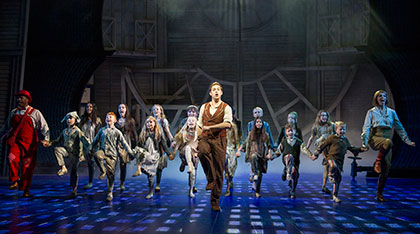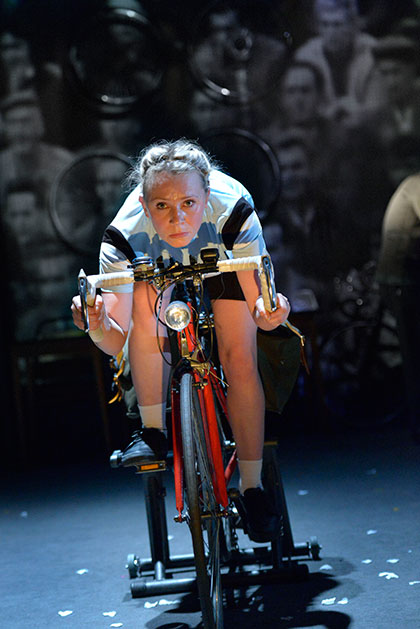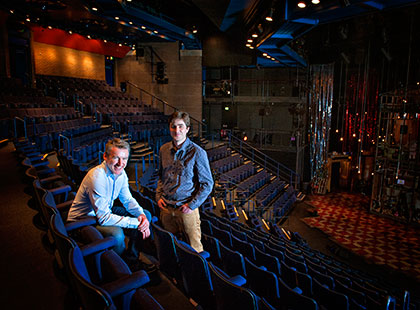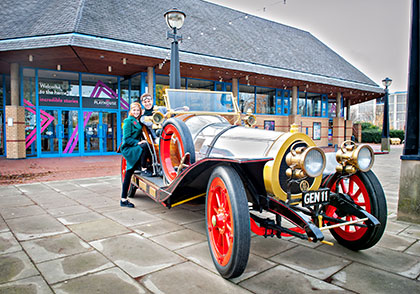In the latest of our regional theatre spotlights, we feature the West Yorkshire Playhouse in Leeds – a thriving cultural centre, developing strong links with schools and the wider community
Looks aren’t everything. From the outside West Yorkshire Playhouse in Leeds is not the most beautiful building in the world resembling, as someone noted when the building opened 25 years ago, a cross between a sports centre and a continental hypermarket. But it’s what goes on inside that counts – and the Playhouse makes not only great theatre but reaches out to engage local people and communities through as diverse a range of activities as you could wish to find.
The theatre’s origins date back to 1964 when a group of 23 passionate drama lovers began a campaign to secure a permanent and professional producing theatre for the city. Five years later the then Leeds Playhouse moved into a temporary home at Leeds University. Determined to find something more lasting they continued to battle for a resident theatre in the city centre.
The £13m building at Quarry Hill – so-called because it was the quarantine area of the city – was six years in the planning and building. At the time it was Britain’s largest new purpose-built theatre dubbed by some as the ‘North’s new national theatre’.
On 8 March 1990 West Yorkshire Playhouse opened its doors to the people of Leeds and since then more than four million people have seen a show on one of the Playhouse stages. In addition to productions, a far-reaching programme of education and outreach work has been created and delivered across the city and beyond.
Jude Kelly, Artistic Director back in 1990, spoke of reaching out to different people across West Yorkshire irrespective of age, background or ethnicity. The current Artistic Director James Brining, who grew up in Leeds, continues to follow that ethos of theatre for all, seeing the move from the university to Quarry Hill as important in making the theatre more accessible. “The significance of this theatre being built close to the city centre 25 years ago was huge. Moving the Playhouse from the intellectual grounds of Leeds University right into the heart of the city’s communities suddenly opened it up like never before,” he says.
“Cementing the relationship between great drama, accessibility and community outreach work has always been a driving force of West Yorkshire Playhouse. It is my vision as Artistic Director to open up what we do even further.
New initiatives have included a Youth Theatre, a Community Ambassadors Scheme, Dementia-Friendly productions, touring our work to community venues, establishing a third production space and a raft of artist development opportunities to sit alongside our programme of world class, cutting edge and popular theatre.”
“We’ve always been about making great theatre but we’ve also been characterised by our engagement with local communities, and I think we are genuinely the people’s theatre of this city,” says James.
The first production was John O’Keefe’s Wild Oats starring Reece Dinsdale, who has returned in recent years to star in Alan Bennett’s autobiographical play Untold Stories and to play the title role in Shakespeare’s Richard III. Since that first production more than 300 productions have been staged with such famous performers as Sir Ian McKellen, Patrick Stewart, Lenny Henry, Christopher Ecclestone, Prunella Scales, Sheila Hancock and Tim Piggott-Smith appearing on the Playhouse’s two stages – the 750-seat Quarry Theatre and smaller Courtyard Theatre space.
What happens on stage is only the tip of the iceberg. Engaging with communities across Leeds and West Yorkshire through a range of activities is at the core of what the Playhouse’s work. There is also a talent development programme supporting directors, writers, actors, designers, technicians and theatre makers, while Open Season in the summer sees the Playhouse doors opened and the stages filled with more than 1,000 performers from companies, schools and youth groups.
“This building is full of people all the time and it’s full of people who are very different from one another. We work with those who have learning difficulties, we work with people from areas of the city and the region that are disadvantaged, we work with asylum seekers and refugees, we’ve worked with people in their 80s with dementia and young children,” says James.

Jon Robyns as Caractacus Potts (centre) and The Cast of Chitty Chitty Bang Bang. Credit Alastair Muir
The Playhouse has a history of exporting its work with productions playing venues around the country in addition to Leeds. One of its biggest hits Beryl, the story of cycling champion Beryl Burton, toured to community centres and village halls in autumn 2015 following two successful runs in the Courtyard Theatre. Next summer the Playhouse welcomes back the hit show The 39 Steps which started its life in Leeds 10 years ago and has continuously played in London and around the country ever since. The current revival of the iconic musical Chitty Chitty Bang Bang, a co-production with Music & Lyrics and directed by James Brining, was made in Leeds, and played for nine weeks at the Playhouse before embarking on a UK and Ireland tour in 2016-17.
Educational activities have an important role to play in the Playhouse repertoire with a vibrant programme of tailored workshops and activities in school or at the Playhouse for students of all ages.
“We strive to provide a variety of dynamic, responsive, meaningful and high-quality creative learning opportunities for secondary schools and college students which ignite a passion for the theatre, provide a platform to discover and develop talent, transform and challenge students’ view of the world, themselves and others,” says Creative Education Manager Aoibheann Kelly.
Consulting with teachers in regards to the range, quality and detailed nature of the work the Playhouse offers to schools is essential. The work aims to provide schools with insights into the rehearsal process and making of the main stage productions.
It works with specific creative team members to contribute to resource materials and plans and delivers a selection of practical workshop opportunities offering a detailed and unique insight into the rehearsal process and experience of live theatre. Students take part in a range of exercises directly from the rehearsal room to discover and practically explore the decisions and ideas taken which shaped the overall production. These sessions are co-delivered with the Assistant Director of each production and when relevant, selected cast members. Sessions take place in Playhouse rehearsal rooms or in school/college.
Very popular with schools are “unlocked sessions” that take place in the main auditorium before or after a show. These focus on the director’s vision and interpretation for a production with the aim of increasing students’ understanding of the role of a director, interpreting text and exploring relationships between key characters. Students have the chance to play the role of a director as they examine a specific scene in the session and direct the actors on stage to experiment with different ways of the playing the scene.
Creative Engagement is currently seeking to enhance and develop its digital resource offer to schools. At present it provides a selection of downloadable resource materials to support productions for teachers. They also work in consultation with English and Drama teachers to plan and write specific resources such as schemes of work, follow-up lesson ideas and co-deliver CPD sessions.
There are opportunities too for teachers to visit rehearsals for Playhouse productions and write online diaries to share their thoughts and comments about the process with other teachers and offer ideas about how to incorporate and translate these observations into classroom planning.
“As a producing theatre, we are a very exciting place for students to visit and feel inspired by,” says Aoibheann.
“Through our backstage tours, career days and industry days, we hope to strengthen students’ understanding of the different career opportunities which exist within the theatre industry. Very often we find that students believe there is no place for them in theatre if they have no interest in acting or directing. We hope these sessions inspire students to consider other career options and possibilities.”
The Playhouse is currently being funded by CAPE UK (SLiCE project) to work in a year-long partnership with a local school, Leeds West Academy, to discover how specific drama strategies and techniques can improve students’ positive engagement with and attainment levels in science as a subject.
The Playhouse is a partner venue for the NT Connections project which celebrates new writing. It works in partnership with ten local companies, including youth theatres and schools, to support them to perform their productions over a week-long festival at the Playhouse every April.
A variety of artists and practitioners work creatively with a group of young people in KS3 from five local schools over seven weeks to devise a theatre performance based on a theme of their choice. The work is then performed on our stage in the summer term. “Teachers have commented that it offers an excellent opportunity for students in KS3 to explore performance in a professional setting and also inspires them to take up GCSE Drama,” says Aoibheann.
The Playhouse aims to be a creative place for everyone with specialist teams delivering projects and programmes with people of all ages and abilities, supporting learning and skill development at every stage of life. With one of the largest education and outreach teams of any theatre in the country, the Playhouse is committed to enabling people to develop through creative activity.
First Floor is the award-winning youth arts centre – a creative and social hub for young people in Leeds – offering a range of music, drama and art activities and courses. It is open to all young people aged 11 to 19 and 14 to 25 with a learning disability during evenings, weekends and holidays, as well as alternative education during the school week. First Floor Manager Gaby Paradis won the UK Theatre Award for Manager of the Year in 2015.
The Youth Theatre, for children and young people aged 8 to 19, offers the chance to “explore, play, devise and create” with weekly classes and holiday projects. Regular performance opportunities develop talent for the next generation of theatre-makers. Last September a playful 5 to 7s group was started on Saturdays. The monthly Story Den presents theatrical storytelling for young children and their carers.
Another pioneering project, the weekly Heydays programme for people aged 55-plus, began when the Playhouse opened and is still going strong with 300 members involved in an extensive range of creative and performing arts, cultural and topical activities.
Our Time are regular creative sessions, fun and support for people living with dementia and their families. The Playhouse held the first dementia-friendly performance and is now sharing its experience with other theatres staging special performances. The work, led by Community Development Manager Nicky Taylor, has been rewarded with three awards.
Captioned performances, British Sign Language performances, Relaxed Performances and audio described performances are all part of an access all areas approach. Creative workshops and Beautiful Octopus Club nights are held with and for adults with a learning disability. Music, drama, visual art, DJing and dance are all on the agenda.
The Playhouse is also the first ever Theatre of Sanctuary. There’s a weekly women’s singing group, Asmarina Voices, for refugees and asylum seekers as well as offering presentation skills training for asylum seekers and volunteers supporting them. They work in partnership with local Schools of Sanctuary organisations and the British Red Cross to deliver awareness-raising sessions and drama workshops in schools to explore this theme.
The building itself is in line for a makeover with plans to turn it into a world-leading 21st century flagship arts venue as Leeds bids to become European Capital of Culture 2023. This would involve “spinning” the building round, with a new entrance and a glass extension looking directly on to the new Victoria Gate and John Lewis development.
James Brining says that “a sense of place” is at the heart of the spring/summer 2016 season. Productions include The Damned United, the story of Brian Clough’s 44-day reign at Leeds United; a new adaptation of Great Expectations by Charles Dickens; and a new production of Kes, telling a love story from the heart of a Yorkshire working class community. The Playhouse will also be working in partnership with companies and artists from across the region – including Opera North, Red Ladder and Phoenix Dance Theatre – to share work that tells stories of how people live in Leeds, Yorkshire and the world.





